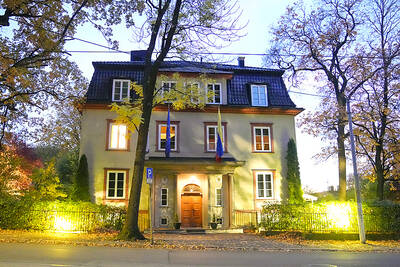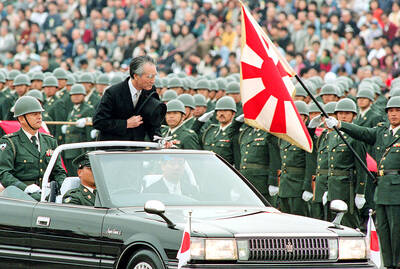Bulgaria’s Turkish minority celebrates the 20th anniversary this week of an uprising that eventually helped topple the country’s communist regime.
On May 19, 1989, Bulgaria’s ethnic Turks — who make up 10 percent of the total population — started a wave of spontaneous protests against the forced assimilatory policies of the communist regime.
Beginning at a funeral in the village of Dzhebel in the southern Rhodope mountains, the protests spread within a week to the south and northeast of the country, regions with large Turkish populations.
In response, Sofia embarked on a policy of ethnic cleansing that left it so isolated internationally — even within the Soviet bloc — that communist dictator Todor Zhivkov was ousted.
Nowadays, the Turkish minority party, the Movement for Rights and Freedoms, is a vital force in Bulgarian politics and has acted as a junior coalition partner in all of the country’s governments since 2001.
But in communist times, the Turks were an oppressed minority, and in 1984, the regime adopted a law forcing them to change their Turkish names to Bulgarian ones, banning their language and outlawing Muslim customs.
“The alternative to changing our names was deportation,” said Reshad Uzturk, a 46-year-old driver from Dzhebel.
And the repressions did not stop there, he said.
“Anyone who spoke Turkish in the street was fined ‘for using incomprehensible language,’ circumcised baby boys were not admitted to kindergarten,” he said.
A 70-year-old woman, who asked not be named, said police tore up their shalwar, or loose trousers, “and made us wear skirts. I was so ashamed I could have died.”
In the communist jargon of the time, the process was referred to as one of national “revival.”
According to the official propaganda, the Turks were actually the descendants of Bulgarians who had been forced to convert to Islam under Turkish rule between the 14th and 19th centuries, but had now forgotten their true origins.
As a Western-oriented country, modern-day Turkey was seen as the arch enemy, just waiting to get its hands on Bulgarian territory.
And the authorities would not tolerate any form of resistance to their national “revival” policies.
In the uprisings of May 1989, nine ethnic Turks were killed and dozens more injured, researcher Mihail Ivanov said.
“The regime was worried about the growth of this minority and responded to the revolts with ethnic cleansing,” said Antonina Zhelyazkova, head of the Sofia-based Center for Minority Studies.
“Leaders of protest movements and thousands of intellectuals were expelled to Turkey. Ordinary people were terrified and followed,” Zhelyazkova said.
On May 29, 1989, communist leader Zhivkov demanded Turkey open its border to Muslims wanting to leave Bulgaria.
The Bulgarian secret service’s archives indicate that some 370,000 Bulgarians of Turkish origin crossed the border between May and November 1989, when Turkey closed it again to stem the influx, Ivanov said.
Only around 155,000 of them later returned.

The Venezuelan government on Monday said that it would close its embassies in Norway and Australia, and open new ones in Burkina Faso and Zimbabwe in a restructuring of its foreign service, after weeks of growing tensions with the US. The closures are part of the “strategic reassignation of resources,” Venezueland President Nicolas Maduro’s government said in a statement, adding that consular services to Venezuelans in Norway and Australia would be provided by diplomatic missions, with details to be shared in the coming days. The Norwegian Ministry of Foreign Affairs said that it had received notice of the embassy closure, but no

A missing fingertip offers a clue to Mako Nishimura’s criminal past as one of Japan’s few female yakuza, but after clawing her way out of the underworld, she now spends her days helping other retired gangsters reintegrate into society. The multibillion-dollar yakuza organized crime network has long ruled over Japan’s drug rings, illicit gambling dens and sex trade. In the past few years, the empire has started to crumble as members have dwindled and laws targeting mafia are tightened. An intensifying police crackdown has shrunk yakuza forces nationwide, with their numbers dipping below 20,000 last year for the first time since records

EXTRADITION FEARS: The legislative changes come five years after a treaty was suspended in response to the territory’s crackdown on democracy advocates Exiled Hong Kong dissidents said they fear UK government plans to restart some extraditions with the territory could put them in greater danger, adding that Hong Kong authorities would use any pretext to pursue them. An amendment to UK extradition laws was passed on Tuesday. It came more than five years after the UK and several other countries suspended extradition treaties with Hong Kong in response to a government crackdown on the democracy movement and its imposition of a National Security Law. The British Home Office said that the suspension of the treaty made all extraditions with Hong Kong impossible “even if

Former Japanese prime minister Tomiichi Murayama, best known for making a statement apologizing over World War II, died yesterday aged 101, officials said. Murayama in 1995 expressed “deep remorse” over the country’s atrocities in Asia. The statement became a benchmark for Tokyo’s subsequent apologies over World War II. “Tomiichi Murayama, the father of Japanese politics, passed away today at 11:28am at a hospital in Oita City at the age of 101,” Social Democratic Party Chairwoman Mizuho Fukushima said. Party Secretary-General Hiroyuki Takano said he had been informed that the former prime minister died of old age. In the landmark statement in August 1995, Murayama said